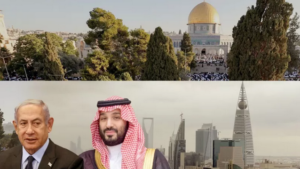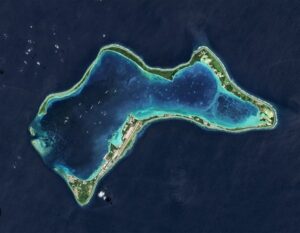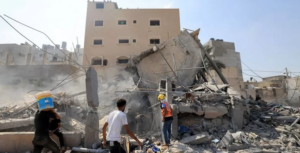
Israel has been bombarding Gaza for the past week after an unprecedented attack by the Palestinian armed group Hamas on Israeli territory. Gaza is now reduced to rubble by Israeli airstrikes.
In the Hamas-Israel conflict, many civilian casualties have also occurred on both sides.
What is the result of this sudden conflict in Israel and a kind of peaceful situation in the Middle East? What does Hamas really want? What effect is this event going to have on the Middle East?
What does Hamas want?
Hamas does not have the capability to enter Israel and defeat the country’s army. Again, it is not possible for Hamas to occupy different areas of Israel and keep it day after day. In reality it did not happen.
Hamas does not even have the ability to counter Israeli airstrikes. But the question is, why did Hamas so deliberately attack Israel?
International political analysts are mentioning a few things in this regard. First, retaliation for Israel’s military raid on Al-Aqsa Mosque last Ramadan.
Second, to prove that Israel’s army is not invincible.
But Hamas’ long-term goals are different. Khaled Ngindi, a senior fellow at the Middle East Institute, told Reuters that Hamas essentially wants to bring Palestinian issues back to the table.
He said, “The situation in Gaza will get heated at times. There will be a rocket attack – then there will be a counter-air attack. After a few days the war will stop again. But the reality of Gazans will not change. This has been a game for years, and Hamas wants to change it.”
“They want an end to the permanent blockade of Gaza. A way to end the Israeli occupation, stop new settlements.”
Yohana Zoref, a senior researcher at the Institute for National Security Studies (INSS), an Israel-based think tank, agrees.
However, according to him, besides bringing the Palestinian issue back into discussion, Hamas wants to achieve two other specific goals. That is, freeing Hamas leaders imprisoned in Israeli prisons in exchange for the release of hostages and ending Israeli interference in Al-Aqsa Mosque.

What is the impact on geopolitics in the Middle East?
Whatever purpose Hamas may have in attacking Israel, it is uncertain how much it will accomplish. But one thing is certain, that is, the Hamas-Israel conflict will change the new geopolitical situation that has developed in the Middle East recently.
In recent years, Israel and the United States have created a situation in the Middle East where many of the Arab countries have focused on building good relations and normalizing relations with Israel, leaving aside the Palestinian issue to pursue their own issues.
After Turkey, Egypt, countries like Bahrain, United Arab Emirates and Morocco signed peace agreement with Israel through Abraham Accord. Now that will ebb and flow.
Turkish Middle East researcher Murat Aslan says that keeping itself relevant in the Middle East was the most important thing for Hamas. And the current situation will benefit Iran more.
“Iran is the biggest beneficiary here. Because Israel bypassed Iran and normalized relations with Middle East countries including Turkey, Egypt, Bahrain. But now it will stumble. Because, the more Israel attacks Gaza, the more anger will be created in the public mind of the Arab countries. As a result, it will be difficult for those countries to advance normal relations with Israel. That’s what Iran wants.”

What about the Saudi-Israel deal?
Now the analysts are saying that it is almost impossible. Murat Aslan says Arab public opinion is sympathetic to Palestine.
The more brutal Israel’s response, the more outraged the public will be. As a result, it is not possible for Saudi Arabia to advance the peace process.
On the other hand, Aaron David Miller, a senior fellow at the Carnegie Endowment for International Peace in the United States, says the same thing.
“Look, Hamas has managed to create a situation where an Israeli-Saudi peace deal is now almost impossible,” said Mr. Carnegie.
“Neither Israel nor Mohammed bin Salman brought up the Palestinian demands in the US-brokered Israeli-Saudi peace talks. Now that deal is impossible.”
Saudi Arabia has already announced that it will stand by the Palestinian people in the “just rights” of the Palestinians and the “establishment of lasting peace” in Palestine.
Washington-based Atlantic Council Senior Fellow Kristen Fontenrose, however, says there is still a possibility of a possible Saudi Arabia-Israel peace treaty.
According to him, Israel must now be careful and responsible that its military response does not result in indiscriminate deaths of innocent Palestinians. That would make it impossible for Saudi Arabia to avoid casualties.
But in the midst of all this, another change has taken place in the Middle East. That is, America has gradually withdrawn from the region and strengthened its presence again.
All in all, the attacks by Hamas have heated up the situation in the Middle East again. But the question remains as to how much benefits Hamas will be able to obtain for themselves.




















+ There are no comments
Add yours